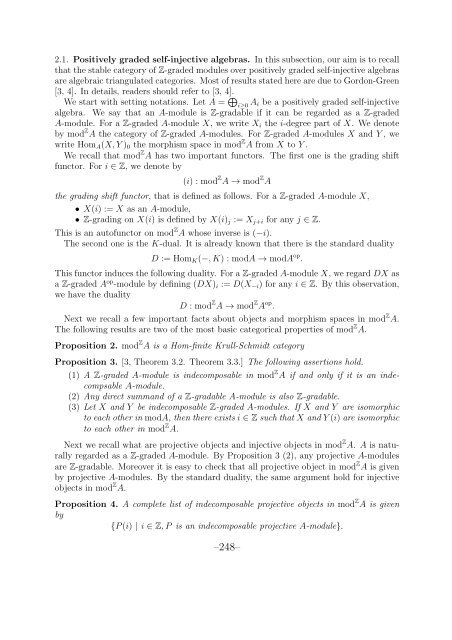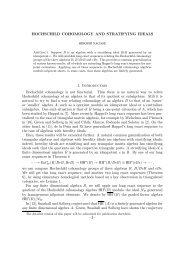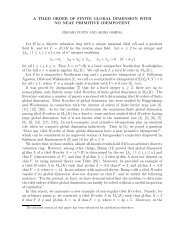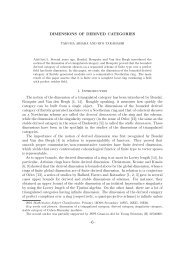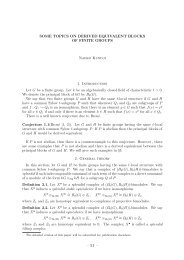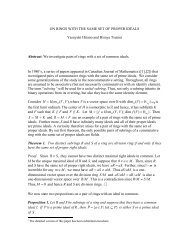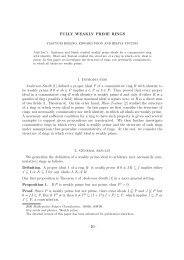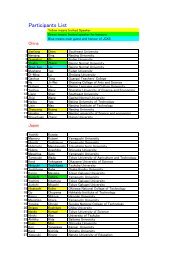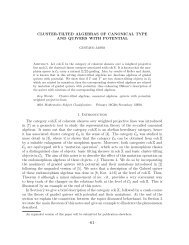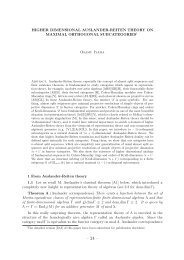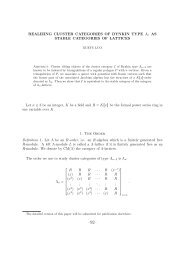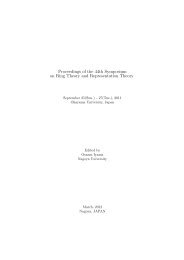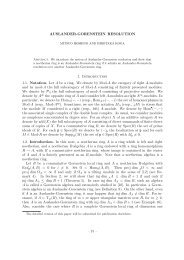Proceedings of the 44th Symposium on Ring Theory and ...
Proceedings of the 44th Symposium on Ring Theory and ...
Proceedings of the 44th Symposium on Ring Theory and ...
You also want an ePaper? Increase the reach of your titles
YUMPU automatically turns print PDFs into web optimized ePapers that Google loves.
2.1. Positively graded self-injective algebras. In this subsecti<strong>on</strong>, our aim is to recall<br />
that <str<strong>on</strong>g>the</str<strong>on</strong>g> stable category <str<strong>on</strong>g>of</str<strong>on</strong>g> Z-graded modules over positively graded self-injective algebras<br />
are algebraic triangulated categories. Most <str<strong>on</strong>g>of</str<strong>on</strong>g> results stated here are due to Gord<strong>on</strong>-Green<br />
[3, 4]. In details, readers should refer to [3, 4].<br />
We start with setting notati<strong>on</strong>s. Let A = ⊕ i≥0 A i be a positively graded self-injective<br />
algebra. We say that an A-module is Z-gradable if it can be regarded as a Z-graded<br />
A-module. For a Z-graded A-module X, we write X i <str<strong>on</strong>g>the</str<strong>on</strong>g> i-degree part <str<strong>on</strong>g>of</str<strong>on</strong>g> X. We denote<br />
by mod Z A <str<strong>on</strong>g>the</str<strong>on</strong>g> category <str<strong>on</strong>g>of</str<strong>on</strong>g> Z-graded A-modules. For Z-graded A-modules X <strong>and</strong> Y , we<br />
write Hom A (X, Y ) 0 <str<strong>on</strong>g>the</str<strong>on</strong>g> morphism space in mod Z A from X to Y .<br />
We recall that mod Z A has two important functors. The first <strong>on</strong>e is <str<strong>on</strong>g>the</str<strong>on</strong>g> grading shift<br />
functor. For i ∈ Z, we denote by<br />
(i) : mod Z A → mod Z A<br />
<str<strong>on</strong>g>the</str<strong>on</strong>g> grading shift functor, that is defined as follows. For a Z-graded A-module X,<br />
• X(i) := X as an A-module,<br />
• Z-grading <strong>on</strong> X(i) is defined by X(i) j := X j+i for any j ∈ Z.<br />
This is an aut<str<strong>on</strong>g>of</str<strong>on</strong>g>unctor <strong>on</strong> mod Z A whose inverse is (−i).<br />
The sec<strong>on</strong>d <strong>on</strong>e is <str<strong>on</strong>g>the</str<strong>on</strong>g> K-dual. It is already known that <str<strong>on</strong>g>the</str<strong>on</strong>g>re is <str<strong>on</strong>g>the</str<strong>on</strong>g> st<strong>and</strong>ard duality<br />
D := Hom K (−, K) : modA → modA op .<br />
This functor induces <str<strong>on</strong>g>the</str<strong>on</strong>g> following duality. For a Z-graded A-module X, we regard DX as<br />
a Z-graded A op -module by defining (DX) i := D(X −i ) for any i ∈ Z. By this observati<strong>on</strong>,<br />
we have <str<strong>on</strong>g>the</str<strong>on</strong>g> duality<br />
D : mod Z A → mod Z A op .<br />
Next we recall a few important facts about objects <strong>and</strong> morphism spaces in mod Z A.<br />
The following results are two <str<strong>on</strong>g>of</str<strong>on</strong>g> <str<strong>on</strong>g>the</str<strong>on</strong>g> most basic categorical properties <str<strong>on</strong>g>of</str<strong>on</strong>g> mod Z A.<br />
Propositi<strong>on</strong> 2. mod Z A is a Hom-finite Krull-Schmidt category<br />
Propositi<strong>on</strong> 3. [3, Theorem 3.2. Theorem 3.3.] The following asserti<strong>on</strong>s hold.<br />
(1) A Z-graded A-module is indecomposable in mod Z A if <strong>and</strong> <strong>on</strong>ly if it is an indecompsable<br />
A-module.<br />
(2) Any direct summ<strong>and</strong> <str<strong>on</strong>g>of</str<strong>on</strong>g> a Z-gradable A-module is also Z-gradable.<br />
(3) Let X <strong>and</strong> Y be indecomposable Z-graded A-modules. If X <strong>and</strong> Y are isomorphic<br />
to each o<str<strong>on</strong>g>the</str<strong>on</strong>g>r in modA, <str<strong>on</strong>g>the</str<strong>on</strong>g>n <str<strong>on</strong>g>the</str<strong>on</strong>g>re exists i ∈ Z such that X <strong>and</strong> Y (i) are isomorphic<br />
to each o<str<strong>on</strong>g>the</str<strong>on</strong>g>r in mod Z A.<br />
Next we recall what are projective objects <strong>and</strong> injective objects in mod Z A. A is naturally<br />
regarded as a Z-graded A-module. By Propositi<strong>on</strong> 3 (2), any projective A-modules<br />
are Z-gradable. Moreover it is easy to check that all projective object in mod Z A is given<br />
by projective A-modules. By <str<strong>on</strong>g>the</str<strong>on</strong>g> st<strong>and</strong>ard duality, <str<strong>on</strong>g>the</str<strong>on</strong>g> same argument hold for injective<br />
objects in mod Z A.<br />
Propositi<strong>on</strong> 4. A complete list <str<strong>on</strong>g>of</str<strong>on</strong>g> indecomposable projective objects in mod Z A is given<br />
by<br />
{P (i) | i ∈ Z, P is an indecomposable projective A-module}.<br />
–248–


